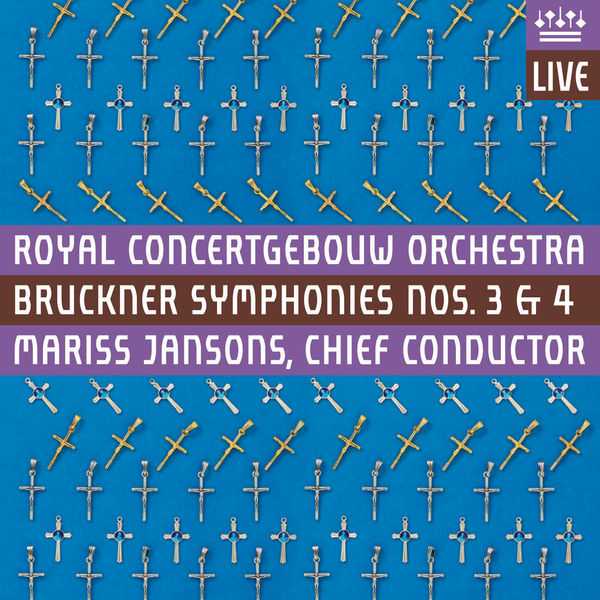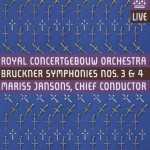

Composer: Anton Bruckner
Orchestra: Royal Concertgebouw Orchestra
Conductor: Mariss Jansons
Format: FLAC (tracks)
Label: RCO Live
Catalogue: RCO09002
Release: 2009
Size: 1.95 GB
Recovery: +3%
Scan: cover
Symphony No. 3 in D minor ‘Wagner Symphony’
01. I. Mehr langsam, misterioso
02. II. Adagio. Bewegt, quasi andante
03. III. Scherzo: Ziemlich schnell
04. IV. Finale: Allegro
Symphony No. 4 in Eb Major ‘Romantic’
05. I. Bewegt, nicht zu schnell
06. II. Andante quasi allegretto
07. III. Scherzo: Bewegt
08. IV. Finale: Bewegt, doch nicht zu schnell
Many of Mariss Jansons’ releases on RCO Live are single SACDs, which should be expected, considering the high price of audiophile recordings. But for this 2009 album, two of Anton Bruckner’s most popular symphonies are combined in a super-audio twofer that runs over two hours in playing time and is twice the usual price. But it’s well worth the expense to have these live recordings of the Symphony No. 3 in D minor and the Symphony No. 4 in E flat major, “Romantic,” packaged together, particularly for the convenience of having two exceptional performances ready at hand. Jansons and the Royal Concertgebouw Orchestra have an intimate rapport that has served them well in other repertoire, notably Mahler, but it is especially pleasing here because this orchestra has a long-standing history of playing these symphonies. Even though Jansons is not known for much work with Bruckner, with only a recording of the Symphony No. 7 to his credit, he has considerable familiarity with the late Romantics, so any gaps in his knowledge of Brucknerian tradition would surely have been filled in rehearsal. The editions used in these performances are the standardized revisions published in the 1950s by Leopold Nowak, so Jansons appears not to be convinced by the original versions that have become fashionable among other conductors. This consideration is critical to the success of a performance, for the differences between Bruckner’s early and late versions are great, often to the point of having completely recomposed movements, and conductors must have a strong preference for one above the others to make them work. In Jansons’ case, his commitment to the Nowak editions gives his performances great power and authority, and it is doubtful that he would have felt a similar confidence in the rougher, more meandering, and much longer Ur-fassungen of these works, particularly the 1873 version of the Symphony No. 3 with its naive Wagner quotations. Furthermore, these editions are familiar to the Concertgebouw musicians, who give them extraordinary levels of energy, passion, and pathos that they could only feel through living with them. RCO’s sound has a vast frequency range and spacious depth, so the full dynamics and dimensions of the orchestra come through the speakers.
Ever since the tenure of its chief conductor Eduard van Beinum (1945-59), the Concertgebouw Orchestra has cherished one of the greatest Bruckner symphonic traditions in the world. Mariss Jansons continues this performance tradition and under his baton, Bruckner has a warm, beating heart: his rhythms are not simply played, they are, above all, experienced.With this release of Bruckner’s Third and Fourth Symphonies, Jansons and his Amsterdam-based orchestra add a new chapter to the RCO’s impressive performance and recording history of Bruckner’s works.



